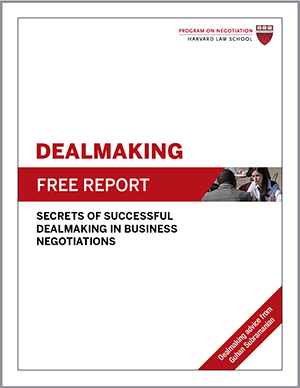
After closing the deal in negotiations, many negotiators often feel a sense of pride. Imagine, for example, that you are a purchasing agent who just scored a significant price concession from a supplier. Now it’s time to hang up the phone and move on to another negotiation with a different supplier. You are feeling proud of how you handled the last negotiation and confident that this next negotiation will go just as well—but will this confidence work in your favor? Perhaps not, according to new research by Virginia Tech professor William J. Becker and Massachusetts Institute of Technology professor Jared R. Curhan.
The Carryover Effect
Emotions triggered by a particular situation (whether a negotiation or some other incident) can carry over and affect our decisions in subsequent negotiations, research by Harvard Kennedy School professor Jennifer Lerner and her colleagues has found. For example, if you have a minor car accident on your way to work, you may still feel angry when working on claiming value in negotiation that morning and behave more aggressively than usual as a result.
We tend to believe that we can put aside such “incidental emotions”—those that are incidental to the task at hand—and negotiate rationally, but that is not usually the case.
Incidental emotions may be particularly relevant to professionals who engage in sequential negotiations—that is, frequent negotiations with different individuals and organizations. Purchasing agents, sales representatives, lawyers in certain realms, human resource professionals, and real estate agents often move from one negotiation to the next with little or no break, for example.
How we feel at the end of one negotiation—a concept known as subjective value—will trigger emotions that may spill over and affect our negotiation behavior with other counterparts in the future.
Pride and Overconfidence
In a lab experiment and a field experiment, Becker and Curhan tested this spillover effect.
In their lab experiment, the researchers had undergraduate business students play the role of a buyer or seller in a negotiation simulation four times in a row, each time facing a different counterpart. When participants had felt bad after closing the deal in negotiations, they tended to perform better on the negotiation that followed, the results showed. The opposite was also true: the better participants felt closing the deal in negotiations, the less effectively they performed in a subsequent negotiation.
In addition, positive feelings among male participants tended to lead to a sense of pride, which in turn led them to perform worse, rather than better, in a subsequent negotiation. (This effect wasn’t found for women; some other, unidentified effect must have explained their results.) Pride, which tends to be stronger in men, may have led men to be inappropriately overconfident in their abilities after closing the deal in negotiations, to their detriment in the next round.
In their field experiment, Becker and Curhan studied the actual negotiations of employees of a U.S. transportation company for lower rates from various fuel suppliers. The results again showed that participants who felt better as a result of one negotiation performed worse in their next negotiation, and vice versa. In addition, for both men and women, positive feelings triggered a sense of pride, which was linked to worse results in a subsequent negotiation.
Managing Incidental Emotions When Closing the Deal in Negotiations
When determining how to close a deal, the following guidelines can help us manage the negative effects of incidental emotions when negotiating sequentially:
- Take breaks between negotiations. When possible, take time off following a negotiation to let emotions such as pride dissipate, lest they carry over and hinder results in your next negotiation. Moreover, managers should be attuned to the carryover effects of emotion and give their employees flexibility over their negotiation scheduling.
- Pinpoint the emotion’s source. Research by Norbert Schwarz (University of Southern California) and Gerald Clore (University of Virginia) has found that labeling the source of an incidental emotion can lessen its impact on our judgments and decisions. So if you are feeling prideful after closing the deal in negotiations, you should remind yourself that your mood is not necessarily relevant to your next negotiation situation.
- Strive for a humble mindset. Because pride from one negotiation can have unwanted consequences on our next one, Becker and Curhan recommend that we try to foster a more humble mindset after success by asking ourselves what we would do differently in the next negotiation.
What other bargaining advice would you offer for closing the deal in negotiations? Share your tips and tricks with our readers in the comments below.
This post is adapted from the article “For Serial Negotiators, Pride May Come Before a Fall,” published in the November issue of the Program on Negotiation’s Negotiation Briefings newsletter. Subscribe to the newsletter today and get the latest negotiation news, information, and strategies delivered monthly.




